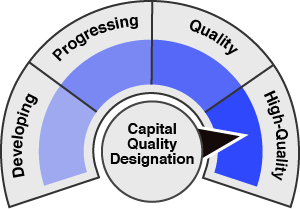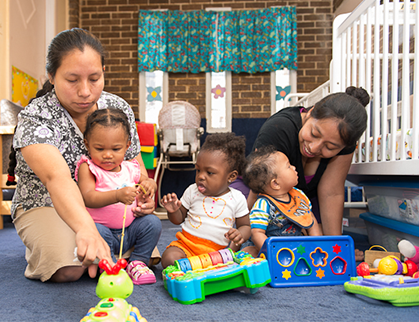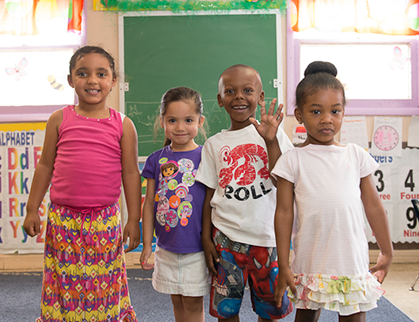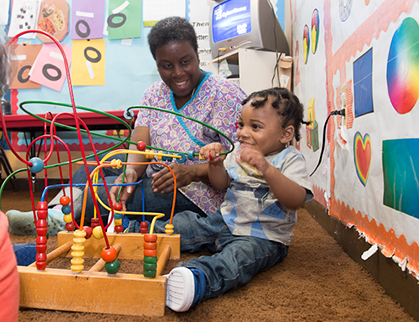 Facility Type: CDC (Child Development Center)
Facility Type: CDC (Child Development Center) Contact: Donna Mason
Contact: Donna Mason  (202) 363-7380
(202) 363-7380 [email protected]
[email protected]
 Not Available
Not Available
|
Facility Hours
Service Schedule: All Year
|
|
|
|||||||||||||||||
|
Language Spoken |
Other Languages Not Applicable |
Facility Capacity 225 |
|||||||||||||||||
|
Accreditation
Type: NAEYC Expires: December 01, 2022 |
Transit Information Get Directions |
Accepts Subsidies Yes |
St. Albans Early Childhood Center's (SAECC) mission is to provide high quality educational services using a developmentally appropriate preschool curriculum for a multi-economic and culturally diverse group of young children.
License Type | Full License |
License Type Definition |
A full license is issued when an applicant has demonstrated substantial complliance with the child development facilities regulations. |
Current License Begin Date | December 15, 2023 |
Current License Expiration Date | November 30, 2026 |
Original License Issuance Date | July 21, 2016 |
| Infant (0 - 12 months) | Yes |
| Toddler (12 - 36 months) | Yes |
| Preschool (36 months - Compulsory Age) | Yes |
| School Age (5 years old by Sept. 30) | Yes |
Accreditation Type |
NAEYC |
Expiration Date |
December 01, 2022 |
| Complaint Date | Allegation Type | Deficiency Code | Resolution Date |
| No current substantiated complaints | |||
Annual, Monitoring and Renewal Inspection Reports – Inspections conducted at a licensed child care facility.
| Inspection Date | Inspection Type |
| 09-08-2025 | Annual |
| 03-18-2025 | Monitoring |
| 09-12-2024 | Annual |
| 05-20-2024 | Monitoring |
| 07-10-2023 | Renewal |
| 03-06-2023 | Monitoring |
|
Designation: High-Quality
These programs meet children’s basic health and safety standards and there is considerable evidence that the program provides a nurturing environment with supportive interactions (e.g., scheduling that meetings children’s needs, warm and positive interactions) that promotes children’s cognitive, physical and social-emotional development.
Effective as of: April 01, 2024 |

|
 Target
Prior Score
Current Score
Target
Prior Score
Current Score
The Classroom Assessment Soring System (CLASS) Pre-K is an observation tool that focuses on interactions between adults and children. CLASS Pre-K includes three categories of teacher-child interactions that support children's learning and development: Emotional Support, Classroom Organization and Instructional Support. For more information on CLASS click here.
The Environment Rating Scales(ERS): Infant/Toddler Environment Rating Scale-Revised (ITERS-R) and Family Child Care Environment Rating Scale-Revised (FCCERS-R) are designed to assess quality in an early childhood or school age care group. Quality consists of the various interactions that go on in a classroom between adults and children. ITERS-R and FCCERS-R also assess the interactions children have with the many materials and activities in the environment. For more information on ITERS-R click here. For more information on FCCERS-R click here.
Curricula are instructional programs that include goals for children’s learning and growth and materials to help teachers in the classroom and families at home. View a list of research-based curricula used in this early care and education program below.
| Name of Curricula |
|---|
| The Creative Curriculum |
Teachers use assessments as tools to observe what children are learning and how they are growing. View a list of research-based assessments used in this early care and education program below.
| Name of Assessment |
|---|
| Ages and Stages Questionnaire (ASQ) |
| Observation notes |
| Teaching Strategies Gold (TSG) |

Teacher planning time is essential to creating a quality learning environment that meets the needs of all children. When child care facilities prioritize paid teacher planning time, teachers are better able to plan lessons, prepare materials and collaborate with colleagues.

|

|

|





